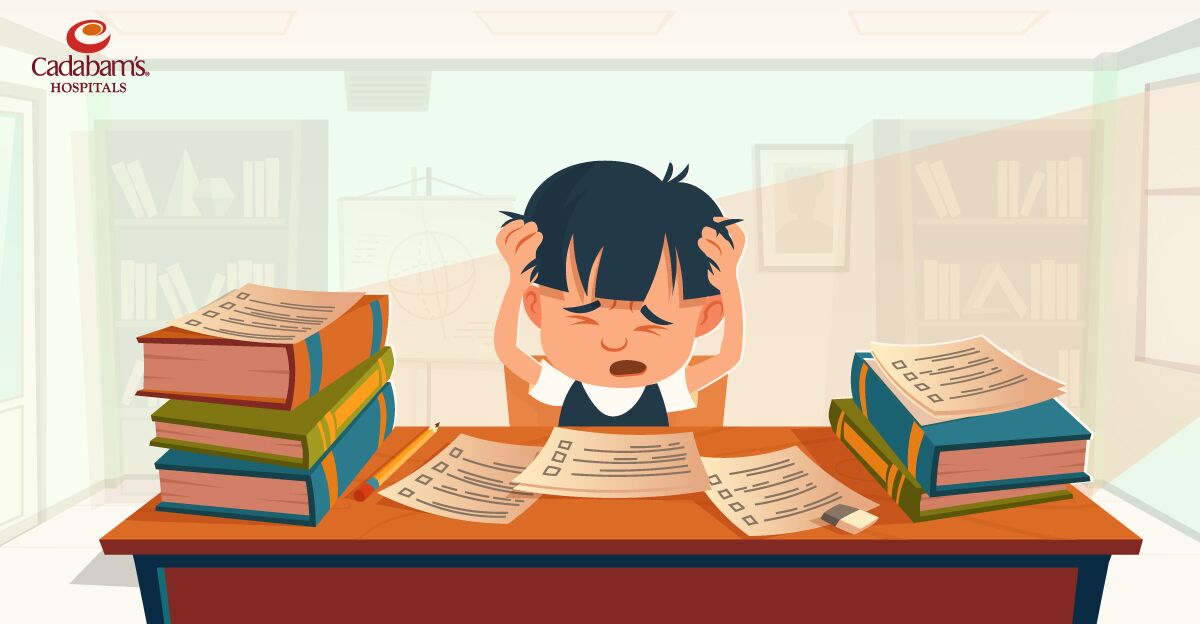Table of Content
It is normal for a parent to feel concerned about their children’s academic performance.
However, if the concern exceeds its normal limits, it could affect both you and your child’s mental health. Parents can become irritable and stressed out. Whereas, in students, test anxiety may manifest as sleepless nights, lack of appetite, nervousness, and anxiety.
Let’s have a look at the causes of exam stress and how you can deal with it.
Causes of Examination Stress
Attaching Self-Worth to Academic Performance
If a child attaches their sense of self-worth or if the parents portray that the child’s worth is attached to their academic performance, then exam time would become a “do-or-die” moment for them. This mindset makes them feel immense exam pressure and a need to perform.
External Pressure
The students can feel pressured due to external pressure, either parental pressure or peer pressure. If children feel like they cannot earn their parents' love unless they do well in an exam, it may hurt the way they look at the parent child relationship. They may start fearing your reactions and start withholding their fears from you.
Lack of Preparedness and Nervousness
When a student does not feel prepared for the exam, the amount of stress they face increases. Lack of preparation can make them continuously worry about what questions would come for the exam. The highly competitive culture or anxiety or other mental health issues can make students feel stressed and nervous.
How to Reduce Exam Related Stress:
When your child's daily life is affected, it is important to take measures to ensure that they are coping with exams well.
Keep It In Perspective:
The result of an exam is an indicator of how well the student has understood and learned a subject, not a judgment on their worth as a human being. Parents should ensure that your child understands this concept.
Furthermore, let your child know that unexpected results and failures are a natural part of life.
Help Your Child Be Organised:
Be involved in your child’s academics. Help them be more organized if they cannot do so on their own. Know your child’s exam schedule and syllabus. Create a study plan with them. Being prepared can boost your child’s confidence. However, keep in mind not to be overbearing and not to micromanage your child! Ensure that your expectations, stress, and anxiety don't spill over to your child.
Cultivate Good Habits:
The key to achieving your aims has always been — practicing good habits.
“You do not rise to the level of your goals. You fall to the level of your systems.” — James Clear, Atomic Habits
So, how can you cultivate good habits?
Ensure that your child has a good system of habits, not just for the sake of exams, but for their mental health and overall success.
Advise your child to revise each day, as per the study plan. If your child knows how much to study each day to cover their portions and follow it, they can avoid frantic stressful all-nighter studying on the last day.
Do not force your child to study throughout the day without any relaxation. Ensure that your child is getting adequate rest. They should take necessary breaks when studying, and have proper meals. Do not cut off all their contacts with friends. This will only increase their stress levels and cause them to resent studying. Usually during exams, parents cut off a child’s hobbies and extracurricular activities. This isn't a good idea as it makes their day monotonous.
Support Your Child:
It is important that your child knows that you support them in their endeavors. Do not give undue importance to an exam, in an effort to stoke your child’s competitive spirit.
Do not compare your child to another student. Instead, teach your child to give their personal best, and be better at learning than they were before.
Reassure your child of your love. Never belittle their efforts or make them feel as if they are not worth your love and respect. This could significantly damage the bond between you and your child.
While it might be disappointing as a parent to deal with bad exam results, use it as an opportunity to build your child’s resilience. Teach them how to overcome disappointments in life, how to learn from one’s mistakes, and prepare better for the next time.
What can you do as parents on the day of the exam?
A few tips to ensure that your child is at their best on the day of the exam:
- Ensure that your kid has a full night’s sleep.
- Confirm that your child has everything they need for the exam the day before itself. Feeling prepared helps ease your kid’s anxiety.
- If they are still feeling anxious, they can practice some breathing exercises to calm down before entering the exam hall.
As a parent, it is your duty to ensure the mental and physical well-being of your child. Teaching your child how to deal with stress, how to plan ahead, how to deal with successes and failures, will help them more in the long run rather than just blind competition.
If exam-related stress is affecting your child’s mental health and disrupting their daily life, get professional help. You can contact us by calling +91 97414 76476 or by visitingour website.
How Cadabam's Help you for Addiction?
- 410+ Professional Consultants
- 1,00,00+ Happy Faces
- 120+ Currently Seeking Treatments





